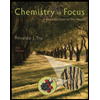
Bundle: Chemistry for Today: General, Organic, and Biochemistry, Loose-Leaf Version, 9th + LMS Integrated OWLv2, 4 terms (24 months) Printed Access Card
9th Edition
ISBN: 9781337598255
Author: Spencer L. Seager
Publisher: Cengage Learning
expand_more
expand_more
format_list_bulleted
Concept explainers
Question
Chapter 23, Problem 23.10E
Interpretation Introduction
Interpretation:
The starting material of glycolysis is to be stated. The product obtained after glycolysis is to be stated.
Concept introduction:
Glycolysis is a part of the catabolic process in living cells. A catabolic process is a process in which larger molecules are broken down into less complex molecules. The energy released in glycolysis is used to form the molecules, ATP (adenosine triphosphate) and NADH (reduced nicotinamide adenine dinucleotide).
Expert Solution & Answer
Trending nowThis is a popular solution!

Students have asked these similar questions
What is metabolism and where is energy produced in cells?
Why does Glycolysis only release a small amount of the total available energy that can be harvested from glucose?
When one glucose molecule undergoes glycolysis, it generates net _____ ATP and ______NADH.
Chapter 23 Solutions
Bundle: Chemistry for Today: General, Organic, and Biochemistry, Loose-Leaf Version, 9th + LMS Integrated OWLv2, 4 terms (24 months) Printed Access Card
Ch. 23 - Why is glucose considered the pivotal compound in...Ch. 23 - Prob. 23.2ECh. 23 - Prob. 23.3ECh. 23 - Describe what is meant by the terms blood sugar...Ch. 23 - What range of concentrations for glucose in blood...Ch. 23 - Prob. 23.6ECh. 23 - Prob. 23.7ECh. 23 - Prob. 23.8ECh. 23 - Prob. 23.9ECh. 23 - Prob. 23.10E
Ch. 23 - Prob. 23.11ECh. 23 - Prob. 23.12ECh. 23 - Prob. 23.13ECh. 23 - Prob. 23.14ECh. 23 - Prob. 23.15ECh. 23 - Prob. 23.16ECh. 23 - Prob. 23.17ECh. 23 - Prob. 23.18ECh. 23 - Prob. 23.19ECh. 23 - Prob. 23.20ECh. 23 - Prob. 23.21ECh. 23 - Prob. 23.22ECh. 23 - Prob. 23.23ECh. 23 - Prob. 23.24ECh. 23 - Prob. 23.25ECh. 23 - Prob. 23.26ECh. 23 - Prob. 23.27ECh. 23 - Prob. 23.28ECh. 23 - Prob. 23.29ECh. 23 - Prob. 23.30ECh. 23 - Prob. 23.31ECh. 23 - Prob. 23.32ECh. 23 - Prob. 23.33ECh. 23 - Prob. 23.34ECh. 23 - Prob. 23.35ECh. 23 - Prob. 23.36ECh. 23 - Prob. 23.37ECh. 23 - Prob. 23.38ECh. 23 - Prob. 23.39ECh. 23 - Prob. 23.40ECh. 23 - Prob. 23.41ECh. 23 - Prob. 23.42ECh. 23 - Prob. 23.43ECh. 23 - Prob. 23.44ECh. 23 - Prob. 23.45ECh. 23 - Prob. 23.46ECh. 23 - Prob. 23.47ECh. 23 - Prob. 23.48ECh. 23 - Prob. 23.49ECh. 23 - Prob. 23.50ECh. 23 - Prob. 23.51ECh. 23 - Prob. 23.52ECh. 23 - Prob. 23.53ECh. 23 - Prob. 23.54ECh. 23 - Prob. 23.55ECh. 23 - Prob. 23.56ECh. 23 - Prob. 23.57ECh. 23 - Prob. 23.58ECh. 23 - Prob. 23.59ECh. 23 - Prob. 23.60ECh. 23 - Prob. 23.61ECh. 23 - Prob. 23.62ECh. 23 - Prob. 23.63ECh. 23 - Prob. 23.64ECh. 23 - Prob. 23.65ECh. 23 - Lactate dehydrogenase catalyzes the following...Ch. 23 - Prob. 23.67ECh. 23 - Prob. 23.68ECh. 23 - Prob. 23.69ECh. 23 - Prob. 23.70ECh. 23 - A friend started to make wine by adding yeast to...Ch. 23 - Prob. 23.72ECh. 23 - Explain why monitoring blood lactate levels might...Ch. 23 - Prob. 23.74ECh. 23 - Prob. 23.75ECh. 23 - Prob. 23.76ECh. 23 - Prob. 23.77ECh. 23 - Prob. 23.78ECh. 23 - Prob. 23.79ECh. 23 - Prob. 23.80ECh. 23 - Prob. 23.81ECh. 23 - Prob. 23.82ECh. 23 - Prob. 23.83ECh. 23 - Prob. 23.84ECh. 23 - Prob. 23.85ECh. 23 - Prob. 23.86ECh. 23 - Prob. 23.87ECh. 23 - Prob. 23.88ECh. 23 - Prob. 23.89ECh. 23 - Prob. 23.90E
Knowledge Booster
Learn more about
Need a deep-dive on the concept behind this application? Look no further. Learn more about this topic, chemistry and related others by exploring similar questions and additional content below.Similar questions
- List, by name, the four general stages of the process by which biochemical energy is obtained from food.arrow_forwardDuring the overall process of glycolysis, in which of the following occurs for each glucose molecule processed. net loss of two ATP molecules net loss of four ATP molecules net gain of two ATP molecules net gain of four ATP moleculesarrow_forwardwhat is the definition of energy from a metabolic perspective?arrow_forward
- Order the steps of the endogenous pathway starting with VLDL in the liver. Question 99 options: excess LDL taken up by receptors in the liver LDL circulates to deliver cholesterol to peripheral cells After a meal, VLDL in liver packaged with trigs and cholesterol and sent into circulation IDL transported to liver and broken down into LDL VLDL interacts with LPL to release its fatty acids. Becomes IDLarrow_forwardThe metabolic reactions that build new molecules inarrow_forwardWhat is the role of NAD and NADH in fermentation?arrow_forward
- Describe the energy output, initial substrates, and end products of the glycolysis process.arrow_forwardHow many electron carrier molecules (both NADH and FADH₂) are made per glucose put in to glycolysis? How many electron carrier molecules (both NADH and FADH₂) are made per pyruvate put in to the Krebs Cycle? How many electron carrier molecules (both NADH and FADH₂) are made by the Krebs Cycle per glucose consumed by the organism? How many electron carrier molecules in total (both NADH and FADH₂) have been made from a single glucose after both glycolysis and the Krebs Cycle? How many electrons are being carried from glucose at this point (Hint: 2 per molecule)?arrow_forwardGlycolysis is the first step in the oxidation of fatty acids to produce energy. True or Falsearrow_forward
arrow_back_ios
SEE MORE QUESTIONS
arrow_forward_ios
Recommended textbooks for you
 Chemistry for Today: General, Organic, and Bioche...ChemistryISBN:9781305960060Author:Spencer L. Seager, Michael R. Slabaugh, Maren S. HansenPublisher:Cengage Learning
Chemistry for Today: General, Organic, and Bioche...ChemistryISBN:9781305960060Author:Spencer L. Seager, Michael R. Slabaugh, Maren S. HansenPublisher:Cengage Learning General, Organic, and Biological ChemistryChemistryISBN:9781285853918Author:H. Stephen StokerPublisher:Cengage Learning
General, Organic, and Biological ChemistryChemistryISBN:9781285853918Author:H. Stephen StokerPublisher:Cengage Learning Organic And Biological ChemistryChemistryISBN:9781305081079Author:STOKER, H. Stephen (howard Stephen)Publisher:Cengage Learning,
Organic And Biological ChemistryChemistryISBN:9781305081079Author:STOKER, H. Stephen (howard Stephen)Publisher:Cengage Learning, Chemistry In FocusChemistryISBN:9781305084476Author:Tro, Nivaldo J., Neu, Don.Publisher:Cengage LearningChemistry: Matter and ChangeChemistryISBN:9780078746376Author:Dinah Zike, Laurel Dingrando, Nicholas Hainen, Cheryl WistromPublisher:Glencoe/McGraw-Hill School Pub Co
Chemistry In FocusChemistryISBN:9781305084476Author:Tro, Nivaldo J., Neu, Don.Publisher:Cengage LearningChemistry: Matter and ChangeChemistryISBN:9780078746376Author:Dinah Zike, Laurel Dingrando, Nicholas Hainen, Cheryl WistromPublisher:Glencoe/McGraw-Hill School Pub Co Introduction to General, Organic and BiochemistryChemistryISBN:9781285869759Author:Frederick A. Bettelheim, William H. Brown, Mary K. Campbell, Shawn O. Farrell, Omar TorresPublisher:Cengage Learning
Introduction to General, Organic and BiochemistryChemistryISBN:9781285869759Author:Frederick A. Bettelheim, William H. Brown, Mary K. Campbell, Shawn O. Farrell, Omar TorresPublisher:Cengage Learning

Chemistry for Today: General, Organic, and Bioche...
Chemistry
ISBN:9781305960060
Author:Spencer L. Seager, Michael R. Slabaugh, Maren S. Hansen
Publisher:Cengage Learning

General, Organic, and Biological Chemistry
Chemistry
ISBN:9781285853918
Author:H. Stephen Stoker
Publisher:Cengage Learning

Organic And Biological Chemistry
Chemistry
ISBN:9781305081079
Author:STOKER, H. Stephen (howard Stephen)
Publisher:Cengage Learning,

Chemistry In Focus
Chemistry
ISBN:9781305084476
Author:Tro, Nivaldo J., Neu, Don.
Publisher:Cengage Learning

Chemistry: Matter and Change
Chemistry
ISBN:9780078746376
Author:Dinah Zike, Laurel Dingrando, Nicholas Hainen, Cheryl Wistrom
Publisher:Glencoe/McGraw-Hill School Pub Co

Introduction to General, Organic and Biochemistry
Chemistry
ISBN:9781285869759
Author:Frederick A. Bettelheim, William H. Brown, Mary K. Campbell, Shawn O. Farrell, Omar Torres
Publisher:Cengage Learning